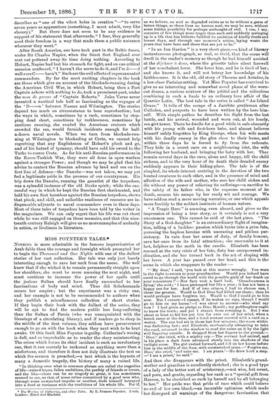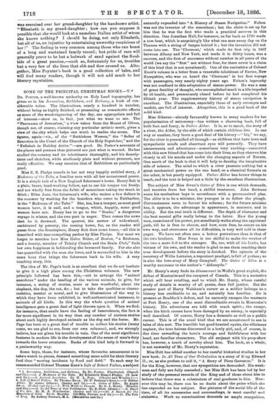MISS POYNTER'S TALES.*
NOTHING is more admirable in the famous improvisatrice of
Arab fable than the courage and foresight which prompted her to begin the Thousand and One Nights with one of the dullest stories of her vast collection. Her tale was only just barely interesting enough to save her neck from the noose. She well knew that if she wished it to remain permanently straight upon her shoulders, she must be more amusing the next night, and must continue to increase the power of her spells until the jealous Sultan should have finally succumbed to her fascinations of body and mind. Thus did Scheherazade secure her empire ; but the experiment was a risky one, and her example is not to be recommended to authors when they publish a miscellaneous collection of short stories. If they begin their book with the dullest of the series, they will be apt to find the modern public less long-suffering than the Sultan of Persia (who was unacquainted with the blessings of a circulating library), and if readers go to sleep in the middle of the first volume, they seldom have perseverance enough to go on with the book when they next wish to be kept awake. Of this fault Miss Poynter is guilty. Catherine's wooing is dull, and so improbable as to render the story uninteresting.
The crime which forms its chief incident is such an involuntary one, that it can scarcely be reckoned as anything more than a misfortune, and therefore it does not duly illustrate the text on which the sermon is preached,—a text which is the keynote of many a domestic tragedy, the history of many a ruined life.
"In thinking over what in common phrase are called the tragedies of life—ruined hopes, fallen ambitions, the perfidy of friends or lovers, and the like—there can be no tragedy so great, it has sometimes seemed to me, as that of some crime committed by a good man who, through some unwatched impulse or another, finds himself betrayed into a deed at variance with the traditions of his whole life. For if,
* The WOOinj of Catherine, and other Tales. By E. Franoes Poynter. 2 vols. London ; Hurst and Blackett. as we believe, no soul so degraded exists as to be without a germ of better things, so there lives no human soul; we may be sure, without some hidden possibility for perhaps unthought-of evil. I can, I say, conceive of few things more tragic than such evil suddenly springing up in a life that has hitherto fulfilled its ambition of kindly deeds and honest days, and through one moment's action, laying waste the years that have been and those that are yet to be."
"In an Inn Garden" is a very short piece,—a kind of literary instantaneous photograph, so real, so vivid, that the scene will
dwell in the reader's memory as though he had himself assisted at the defamer a dens, where the grisette takes silent farewell of her nonchalant lover. She loves him, and he is tired of her; and she knows it, and will not betray her knowledge of his faithlessness. It is the old, old story of Theseus and Ariadne, in a low-class Parisian setting. Yet Miss Poynter has contrived to give us an interesting and somewhat novel phase of the worn- out drama, a curious mixture of the pitiful and the ridiculous combining in such a finale to an ordinary love affair of the Quartier Latin. The best tale in the series is called "An Island Grave." It tells of the escape of a Jacobite gentleman after Culloden, and purports to have been written by the hero him- self. With simple pathos he describes his flight from the lost battle, and his arrival, wounded and worn out, at his lonely, sea-girt tower. There he dwells for a good while in safe obscurity with his young wife and first-born babe, and almost believes himself safely forgotten by King George, when his wife meets with his deadly enemy in the glen close to their home, and within three days he is forced to fly from the redcoats. They hide in a secret cave on a neighbouring islet, the wife following her husband, and bringing the baby with her. They remain several days in the cave, alone and happy, till the child sickens, and in the very hour of its death their dreaded enemy suddenly appears in their hiding-place. The tale is of the simplest, its whole interest centring in the devotion of the two hunted creatures to each other, and in the presence of mind and affection of the wife and mother, who sees her child sicken and die without any power of relieving its sufferings—a sacrifice to the safety of its father who, in the supreme moment of its death, secures his escape by her ready wit and courage. We have seldom read a more moving narrative, or one which appeals more forcibly to the noblest instincts of human nature.
"A Tragic Hero" is amusing, even absurd, and gives us the impression of being a true story, as it certainly is not a very uncommon one. This cannot be said of the last piece. "The Story of a God-daughter" is an extraordinary flight of imagina- tion, telling of a luckless passion which turns into a grim fate, pursuing the hapless heroine with unceasing and pitiless per- sistency. In vain does her sense of duty, of family honour, save her once from its fatal attraction ; she succumbs to it at last, helpless as the moth in the candle. Elisabeth has been rescued at the very crisis of her fate, duty has overpowered in- clination, and she has turned back in the act of eloping with her lover. A year has passed over her head, and this is the scene in which she reappears to the reader :—
"'My dear,' I said, yon look at this matter wrongly. You were in the right to return to your grandmother. Would you indeed have cared to go through the world with the possible guilt of her death on your conscience ?'—Her face took a hard look. Grandmamma is dying,' she said; ' I have prolonged her life a year ; it has not been a happy one for her. And if of two crimes, I had to choose one, I chose the greater. Would to God Dino had killed me there; then he would perhaps have forgiven me. Would to God I could go to him now. But I cannot—I cannot, if he makes no sign, though I would go to him on my knees.'—I was about to answer—who shall say how ? I had given no pledge to Dino Morelli ; my goddaughter ought to know the truth; and yet I shrank from revealing it. But I was about at least to bid her put him for ever out of her mind, when a knock came at the door, and a hotel servant entered with a card on a waiter. The sun had set in these last few minutes ; the room within was darkening fast; and Elisabeth, mechanically advancing to take the card, returned to the window to read the name on it by the light still lingering outside. It dropped from her fingers to the ground.— ' Dino !' she cried, with a mighty cry.—The servant had retired, and in his place a dark form advanced slowly into the shadows of the twilight room. The girl rushed forward, and fell on her knees before him in the middle of the floor, with outstretched arms.—' Forgive me, Dino,' she cried, 'and take me. I am yet:ire—He drew b wit a step. I am a priest,' he said."
And then she disappears with the priest. Elisabeth's grand- mother and guardian is excellently sketched; she is a good type of a lady of the better sort of aristocracy,—not wise, but sweet, and pure, and gentle, regarding her rank as a "special gift from Heaven, to be cherished as such by herself and by all belonging to her." Her pride was that pride of race which could believe no evil of her own blood,—an incurable optimism which made her disregard all warnings of the dangerous fascination that
irassewercised over her grand-daughter by the handsome artist. "Elisabeth is my grand-daughter ; how can you suppose it possible that she would look at a nameless Italian artist of whom she knows nothing ? I should be doing, not only Elisabeth, bat all of uf4 an injustice by entertaining unworthy suspicions of her !" The feeling is very common among those who can boast of a long and unstained family record ; but pride of race will generally prove to be but a bulwark of sand against the flood- tide of a great passion,—such as, fortunately for us, troubles but a very few of the lives that ebb and flow around us. Alto- gether, Miss Poynter's book is a good collection of tales, and will find many readers, though it will not add much to her literary reputation.











































 Previous page
Previous page